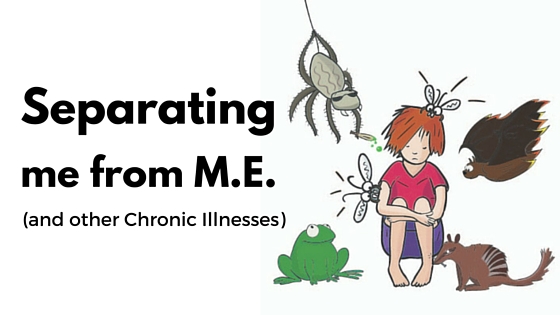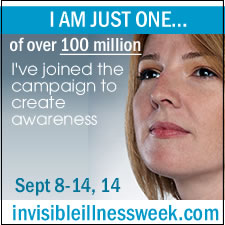Imagine waking every day and being unsure about what you’ll be able to achieve that day. You may wake up to pain levels so high that even rolling over in bed is too painful, or maybe your energy is so low that you can’t even get your eyes to open properly…
Maybe, like me, you don’t need to imagine this at all. Maybe you live with a chronic illness that makes your life unpredictable and very VERY frustrating.
When you have a chronic illness it can be quite easy to be hard on yourself for all the things you struggle to do, or simply can not do, on a daily basis. These things can be as simple as taking a shower or brushing your teeth. Things that others may take for granted.
One tool that I’ve learnt to have in place to help me and my extended family and friends cope better with my multiple chronic illnesses is to find a way to separate myself from the illness. When I’m unable to do something, I (usually) remember that I shouldn’t be angry or frustrated at myself. It’s the illness and it’s symptoms that I should be angry and frustrated at.
A great way I’ve found to separate me from my conditions, is to personify my illnesses (or at least the main symptoms I face). The characters I’ve created are Foggy Frog and the Pain Gang. By personifying my symptoms in this way I can say things like “it’s Foggy Frog that is making it difficult to make a coherent sentence today” or “Stabbing Spider that has taken my breath away.”
Having this separation between myself and my illness helps me keep a positive and open attitude towards my life. It gives me room to focus on the things I can do or the things around me that I can be grateful for. I can focus on all the things I am; I aim to live as simply, sustainably and meaningfully as possible. I am passionate about working with others. I am a loving wife and caring friend. I am an advocate and an educator. I am not just my illness!
The separation also helps with my relationship with my husband. When he’s frustrated at what I can’t do, we can both be angry and frustrated at the illness and I don’t feel the need to take things too personally. We are able to talk openly about how we feel and, as long as we can maintain the separation between me and my symptoms, the anger should be aimed at the illness and not me.
The idea of separating yourself from your illness is generally discussed from the point of view of mental illness such as OCD, Schizophrenia, Bipolar or Depression, but I’ve found it useful living with physical conditions such as Myalgic Encephalomyelitis and Fibromyalgia and I’m sure it can be applied to many other conditions.
Chronic illness makes life difficult at the best of times. Having to deal with both constant and unpredictable symptoms can take a major toll on your self esteem and general mental health. However, by separating ourselves from our illnesses we can nurture a healthier relationship with our bodies, our lives, and our families that will allow us to remember who we actually are. We are not our illnesses.
What techniques do you have in place to separate yourself from your illness or to otherwise maintain your mental health?







